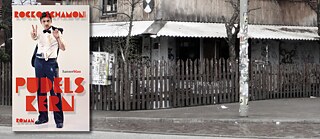"Rural punk" Rocko Schamoni delivers the second part of his autobiography in his familiar anecdotal style, in which he gains a foothold in the Hamburg music scene, tries his hand as a rock star and eventually becomes co-founder of the Pudel Club, a beacon of Hamburg's nightlife.
The glimmer on the horizon
With his eighth book, Rocko Schamoni, the all-round artist from northern Germany, continues the biography he began with Dorfpunks. The year is 1986 and Pudels Kern tells the story of 19-year-old Tobias Albrecht (later Rocko), who is drawn away from his home in Lütjenburg:(...) I see it at night and feel it during the day, the pull of a great distant power - and I know its name: Hamburg. Especially Sankt Pauli.
"Am I on the run or on the hunt?"
But Rocko doesn't let it get him down, continues to write songs, plays the lead role in the completely broken road movie Rollo Aller! (and the no less weird sequel Rollo Aller! 2) and continually moonlights as a barman in various trendy Hamburg bars. One could assume that his true talent lies not in his art, but in his personality. He doesn't belong to a particular gang; he belongs to everyone. He connects with people and makes friends with them. As a barman, he transforms the run-down (to put it mildly) Sorgenbrecher bar into a trendy hangout, and from the remains of an used clothing clearance sale, he and his friends create the Pudel Boutique, a kind of second-hand art space with a "dance room", where they also put on shows, including one with a certain young comedian called Helge Schneider (years later a well-known trademark for absurd humor), who becomes an important source of inspiration for Rocko. But when this place had to be torn down, Rocko and his friends, including Goldene Zitronen singer Schorsch Kamerum, discovered another derelict building at the harbor, which in 1991, the year the book ends, became the later world-famous Golden Pudel Club, a guarantor for rampant party nights and the undisputed nexus of Hamburg's nightlife.You will fall and die
Unlike the other seven Schamoni works, or the first part of the autobiography, in Pudels Kern the person Rocko Schamoni is not hidden behind his typical ironic jokes (although of course there are plenty of them). His story is characterized by recurring self-doubt, a lack of drive and purpose, panic attacks and depressive phases in equal measure. The "King" falls into mood holes, speaks of "self-loathing and regular suicidal fantasies", which he has to have treated by a therapist.But when I'm out at night, I feel safe on the street, in the clubs, bars and pubs, among all the other lost people, where I can show off after a few drinks and behave confidently. I'm lucky that my youth means that my neglect isn't immediately obvious, and I impress many people as a wild and impetuous actionist beast, a daredevil jumping jack, no one suspects what I'm like when I turn from Hyde back into Jekyll at the end of the night at home.
On a Friday evening in early summer, we open our new domicile. Music and art professionals, night owls and boozehounds, druggies and civilians, the wild and crazy, the strenuous and overexcited, the show-offs and posers, the homeless and those seeking warmth, the glittering, puffed-up underground come to check out the news, check out the location, inaugurate the future of their nights. It is immediately clear to everyone that this is the place - THE PLACE - everything is just right here
The King is dead, long live the King!
Verlin: hanserblau, 2024. 304 S.
ISBN: 978-3-446-27936-0
You can find this title in our eLibrary Onleihe.
Further reading:
Christoph Twickel (Hrsg.): Läden, Schuppen und Kaschemmen: Eine Hamburger Popkulturgeschichte
Hamburg: Edition Nautilus, 2003. 253 S.
ISBN: 978-3-89401-425-4
July 2024
